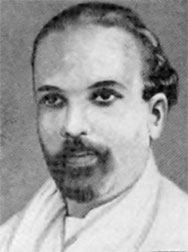From Silva to Walisinghe Harischandra
by Padma EDIRISINGHE
It was years ago I read the biography of Walisinghe Harischandra. It
was an out of proportion book with a big head tapering towards a
thinning end. The big head included a long narrative of the names of the
Buddhist savant from Christian Negombo. The author states that
Harischandra was a later acquired name, for he was born into a Silva
family of the coastal town, probably Angurukaramulla, a suburb.
|

Walisinghe Harischandra |
The name change was almost inevitable for he eventually joined the
bandwagon of those who began to take up what seemed a rapidly losing
Buddhist cause bulldozed by the church, half-brother of the colonial
regime with an equally proselytising zeal. He finally ended up the
resuscitator of Anuradhapura.
Hectic work
A visit to the pooja city of Anuradhapura had just agonised the young
man who after much hectic work did in his 30s. “A wise man’s life of 30
years is worth 100 years of a fool’s life” – Anon. The sacred and
historical city, capital of Lanka for 1000 plus years, hence had with
passing time and sheer negligence got drawn into the chute of the earth
and lost in the wilds like the kingdom of Kotte.
He could not seriously attend to unearth the city under the foreign
name of Silva. In fact, the name had seeped here from Portugal,
considered the arch enemy of Buddhism in the context of the cruel events
of the 16th and 17th centuries.
Today the great man stands tall in the city, in the form of a statue
put up by grateful Buddhists. Back to his name change. Following
Anagarika Dharmapala who changed his name from Davith to Dharmapala,
Walisinghe Harischandra discarded his former name - Silva. However, the
biographer extols the original name Silva, rationalising that the name
sprang from the “Sylvan copses of Portugal” and hence was not at all a
derogatory name. He goes on to recount how the Portuguese had a habit of
coining names from natural phenomena as rivers, gardens and waterfalls.
Now we will go on to another name, Perera which Portuguese name like
the Silva outdoes in number the original country. It assumes various
forms as Pereira used by Burghers of Sri Lanka. It has almost become an
indigenous name so much so that in narratives, occurs this form, “This
person, let us call him Perera, was a regular visitor to the village
temple. “Town, bar” a Sinhala women’s weekly once carried a hilarious
piece under the title, “Mrs. Silva in conversation with Mrs. Perera
across the fence” – “watata udin Perera nonai Silva nonai.” I never
missed it.
Now where am I? Let us get to the ferries or Feriras.
A drive along the the Colombo-Avissawella road is a voyage along a
most picturesque landscape, the Kelani river gurgling and running a
speedy race along trying to compete with the main road. Actually the old
road to Kandy ran along the highway. Now boards greet your eyes,
“Kosgama ferry.” “Hanwella ferry” and “Pugoda ferry.” They take me to a
life by the Kelani, the boatmen and their boat songs and the women
bathing in artless exposure. The construction of the Hanwella bridge was
the death knell of the Hanwella ferry along with the ceasing of the
haunting boat songs or Paru Kavi.
I was reminded of them recently when experiencing the pleasure of
driving along the foothills of The Alps. Silvery streams of water gushed
down the mighty hills and there came into view boards, Ferreira No. 1,
Fereura No 2. I have by this time got used to the Euro custom of
feminising certain phenomena. ‘Toiletta’ for toilet and ‘Europa’ for
Europe. So, here is Ferry turning to Fereira. And my mind turning and
twisting, I remembered the biography of Harischandra, where in its long
introduction it describes the practice of Portugal to carve out names
from nature. But this is still not Portugal yet a region veering towards
at, somewhere in Italy.
These lands now all in a common Euro bond share many facets of
civilisation including names. Earlier they were all a part of the Holy
Roman Empire which according to cynics was neither Holy nor Roman. So,
Fereira used for a ferry could be the origin of Perera who roams in
1000s on Lankan soil today. Just a bold surmise. Since the sound ‘F’ is
not represented in the Sinhala script Perera takes over from Fereira is
obvious.
The Free Encyclopaedia defines Fereira as a Portuguese or Galician
surname with toponymical origins (origins connected to land).
|


